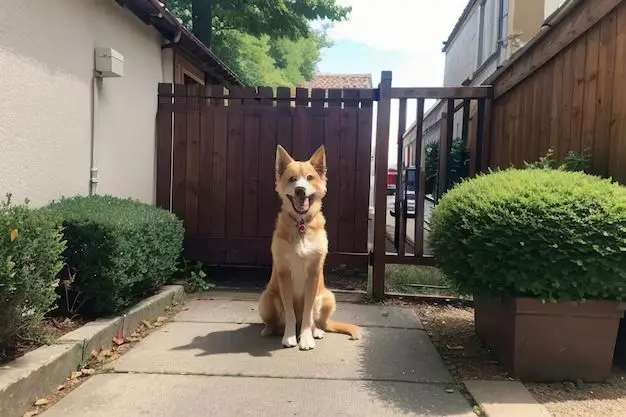When it comes to choosing the best type of fence to keep dogs contained in your yard, there are a few important factors to consider. The main goal is finding a fence that will be secure, durable, and suit the specific needs of your dog. In this article, we’ll explore some of the most popular fencing options for dog owners and the pros and cons of each type.
Page Contents
Wooden Fences
Wood fences are a classic choice for many dog owners. They provide an attractive look that can complement many home styles and landscapes. Some key considerations for wood fences include:
- Cedar and redwood are rot-resistant woods that make good choices.
- Pressure-treated pine is a more affordable option but requires staining/sealing to prevent rot.
- Taller fences over 6 feet help contain large/athletic dogs.
- Gaps should be monitored to prevent digging/escaping.
- Can require regular maintenance (staining, repairing).
Chain Link Fences
Chain link is one of the most secure and cost-effective fencing options for dogs. Considerations include:
- Galvanized steel wire prevents rusting.
- Durability makes it a good choice for chewers/diggers.
- Openings are small enough to prevent escapes.
- Can be installed with privacy slats.
- Not the most attractive visually.
Wrought Iron Fences
Wrought iron fencing provides a decorative look along with durability. Things to keep in mind:
- More expensive than other options but long-lasting.
- Iron/steel resists chewing damage.
- Stylish designs such as gothic patterns.
- Sharp points may pose safety risk for pets/kids.
- Gaps should be monitored to avoid escapes.
Electric Fences
Electric or invisible fences use wires transmitting mild shocks to keeps pets contained. Considerations are:
- Most affordable containment option, good for large areas.
- Training is required for dogs to understand boundaries.
- Not suitable for aggressive pets or with kids/others nearby.
- Power outages disable the fence.
- Doesn’t provide physical barrier or mark boundaries.
Welded Wire Fences
Welded wire offers a more secure alternative to traditional wire mesh fencing. Here are some factors when choosing welded wire:
- Sturdy rigid panels resist being pushed/pulled.
- Small consistent gaps prevent escapes.
- Galvanized or vinyl coatings prevent rust.
- Sharp wires may pose safety risk for dogs.
- Not the most attractive visually.
Aluminum Fences
Aluminum offers a nearly maintenance-free fencing that holds up well. Consider these factors:
- Lightweight yet durable against weather and chewing.
- Visually appealing ornamental styles.
- One of the more expensive options upfront.
- Some aluminum alloys more prone to denting.
- Gaps should be monitored for escapes.
PVC Fences
For a low-maintenance plastic fencing, PVC is a top choice. Here’s what to know about PVC fences:
- Resists moisture, rotting, and insects.
- Vinyl-coated PVC adds decorative look.
- Never needs painting or staining.
- Not as strong as wood/metal, may not contain athletic dogs.
- Can become brittle and crack over time.
Conclusion
When reviewing the many fencing options for containing dogs, key considerations are security, durability, maintenance needs, aesthetics, and overall value. For pet owners seeking a sturdy and protective barrier, chain link or privacy fencing are top choices. Wood and aluminum fences provide an attractive look with more regular maintenance needs. Welded wire and PVC offer secure containment with fewer visual appeals. And electric fences provide the most flexibility and affordability, but require training. Review your specific needs and environment to determine the optimal fencing solution for safely and stylishly containing your furry friends.
